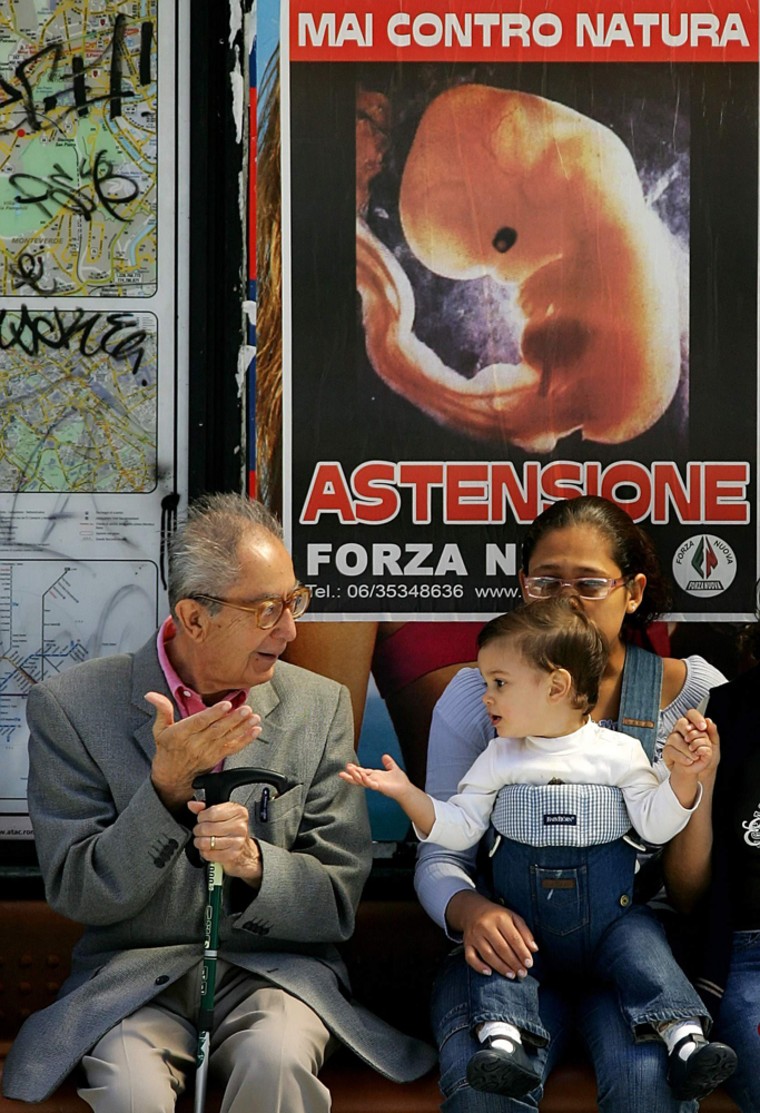ROME — Italy was once considered the "Wild West" for fertility medicine. There were hardly any regulations on research, in-vitro fertilization, or sperm and egg donors. One case even allowed a woman in her sixties to conceive with the help of doctors.
But that all changed in February of 2004.
The government here passed a law, backed by the Roman Catholic Church, which clamped down on assisted fertility.
Overnight Italy's fertility laws became some of the most restrictive in Western Europe.
After a year of great public controversy over this new law, the issue is going back to the voters in a referendum this weekend on whether or not to roll back some of those restrictions.
National debate
As it stands now, the law defines life as beginning at conception, bans most research on embryos, and forbids sperm and egg donors from outside the couple. It also says that no more than three eggs can be fertilized at one time, and that all three must be transferred to the womb simultaneously.
Gay couples, single people and women over the childbearing age are not permitted to take part in in-vitro fertilization and other fertility procedures. This has forced many couple to go elsewhere in Europe for treatment.
Those who break the law can face fines of between $366,000 and $1.2 million and up to 20 years in jail.
Talk of the referendum has made headlines almost daily in Italy, causing rifts within political parties, and bringing forth the views of everyone from women's groups to politicians, and from parish priests to the pope himself.
Even movie starts are getting into the fray. "What do politicians and priests know about my ovaries? This is an issue for scientists and for women," said Monica Bellucci, the Italian actress American audiences may recall from her portrayal of Mary Magdalen in Mel Gibson’s “The Passion of the Christ.”
Church stance
As it has done in the past on issues such as abortion and divorce, the Catholic Church came out strongly against the referendum, urging Italians to boycott the vote. In order for the law to be changed, there needs to be a voter turnout of 50 percent plus one.
Cardinal Camilo Ruini, president of the Italian Bishops' Conference said that any alteration would be a "serious worsening of the law." He also said it is too complex an issue for a simple "yes" or "no" vote.
Pope Benedict XVI weighed in, although without specifically mentioning the referendum. At a recent bishops' conference, he stressed the importance of defending human life and the role of the family, saying that even in Catholic Italy, “the family is exposed to the current cultural climate, therefore to risks and threats that we all know."
The church's stance is not surprising. Pope Benedict's predecessor, John Paul II was adamantly opposed to any kind of artificial manipulation of human life.
Politics of debate
Those who favor changing the law have accused the pontiff of interfering in Italian politics. Daniele Capezzone, the secretary of Italy's Radical Party, asked Italian president Carlo Ciampi to make a statement to preserve the separation of church and state.
Opponents of the law say that it threatens women's rights and puts a damper on scientific research.
Doctors have gone on strike to promote a "yes" vote and Italian Nobel Prize-winning scientists support the change, saying that the laws risked "excluding Italian scientists from the international scientific community."
As for dissention within the political ranks, Gianfranco Fini, the Italian foreign minister, and a member of the far-Right National Alliance, went against party views by stating that he will vote "yes" for three of the four measures.
Recent polls suggest that most Italians want the law changed, but do not feel strongly enough about it to give up a weekend at the beach.
